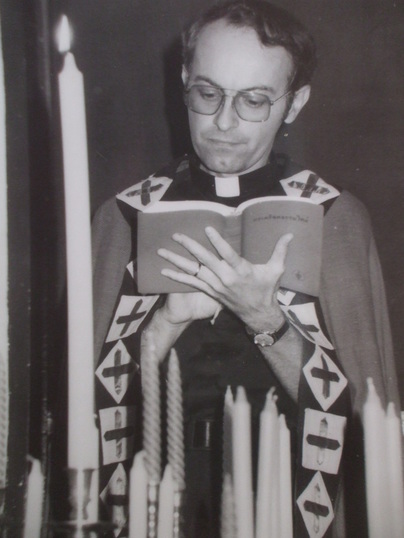|
I have spent my life listening to the sounds of Christianity crumbling. Creak, crack, crunch … chunk by chunk the world-wide church is splintering first here then there. Nothing world-wide will withstand the collapse in the end.
I hasten to say Christianity is growing. Membership is increasing and there is not the least reason to believe this trend will falter. It is the world-wide-ness of Christian organizations that is ending. That is what I find sad – and disappointing because I felt recruited for and called to a role as a Presbyterian in helping the Ecumenical Church grow. [The picture accompanying this essay is from 1980 at the crest of my expectations for the world-wide church.] This week it is world-wide Anglicanism that we heard cracking. The North American Episcopal Church has been formally “suspended” from world Anglicanism. The idea that there is a world-wide Anglican community is now in jeopardy. Episcopal bishops and the presiding bishop (the North American primate) no longer have a voice or vote where it matters in Anglican councils. Unity is a lost priority. When I was a seminary student in 1962-1965 I was closest to Dr. Lew Briner at McCormick Theological Seminary. He was one of the Presbyterian observers at the Second Vatican Council. Heated by hopes raised in Rome, a first step toward reunification was to unify forms of worship built around a “Common Lectionary” patterned on liturgical reforms of Vatican II. We Protestants would raise our worship forms as Vatican II was modernizing Roman Catholic liturgies. We would meet them in the middle. Meanwhile, Protestants in North America, Canada, Australia and India (and nearly everywhere) developed united, re-united, or uniting churches. An ongoing Consultation on Church Union helped member denominations in the USA design worship books and plans for merger. There was enthusiasm for forms that would be compatible world-wide. As Dr. Briner’s enthusiastic protégé, I drafted a worship textbook for our seminary in Thailand based on the concept that worship would soon be what was being discussed in Rome and in all branches of the World Council of Churches. If Evangelicals didn’t want to get on board this fast-moving band wagon they would be left behind. Then Rome balked. The common lectionary was rejected. The Roman Catholic Church decided not to revise the calendar of readings very much. Before long, unification actions were outnumbered by splits and defections, small at first but then much larger. Simultaneously, former mission churches achieved mature independence, not only with regard to funding and leadership, but independence of theology and tradition based on “relevant history”. Few of these emerging mission and independent churches and movements wanted anything to do with unity. The Ecumenical Movement was going to have to be sustained by older churches, but then the compelling reasons for making the effort began to fade and at the same time revolts began to fester. The united, world-wide missionary effort faded, and with it went the idea that it is better to work together than to build churches competitively. Every couple of decades brought a new cause for revolt: feminist issues (e.g. women pastors) split churches, presumed communist leanings or social liberalism aggravated large sectors, and now we have gender and sexuality as a presenting issue for further fractures. During these decades of decline in the hope for detente and reconciliation I have become convinced that Christian church leaders have been myopic about what it is all about. As recently as yesterday I read an Anglican scholar’s summary of the decision in London, saying that it is all about conservative Southern Hemisphere versus liberal social views, as if this is exclusively a church issue. We have all talked about church schisms that way. It’s the church splintering over something, of course. So we look no further. Now I want us to look again. The trend has been toward cultural localization all over the world at the same time as there is economic globalization. The “issues” leading to revolts have supplied energy to incite separatist action, but the ISSUES behind the issues are the same pressures that have split countries, ended empires, divided societies and accelerated ethnic eradication efforts beyond counting since the end of “World War I/II”. I believe THE ISSUE springs from a crisis of identity and meaning. The more economic globalization there is the more cultural localization emerges. The name of this localization is tribalism. It is on the rise again.
0 Comments
Leave a Reply. |
AuthorRev. Dr. Kenneth Dobson posts his weekly reflections on this blog. Archives
March 2024
Categories |
| Ken Dobson's Queer Ruminations from Thailand |
|

 RSS Feed
RSS Feed
